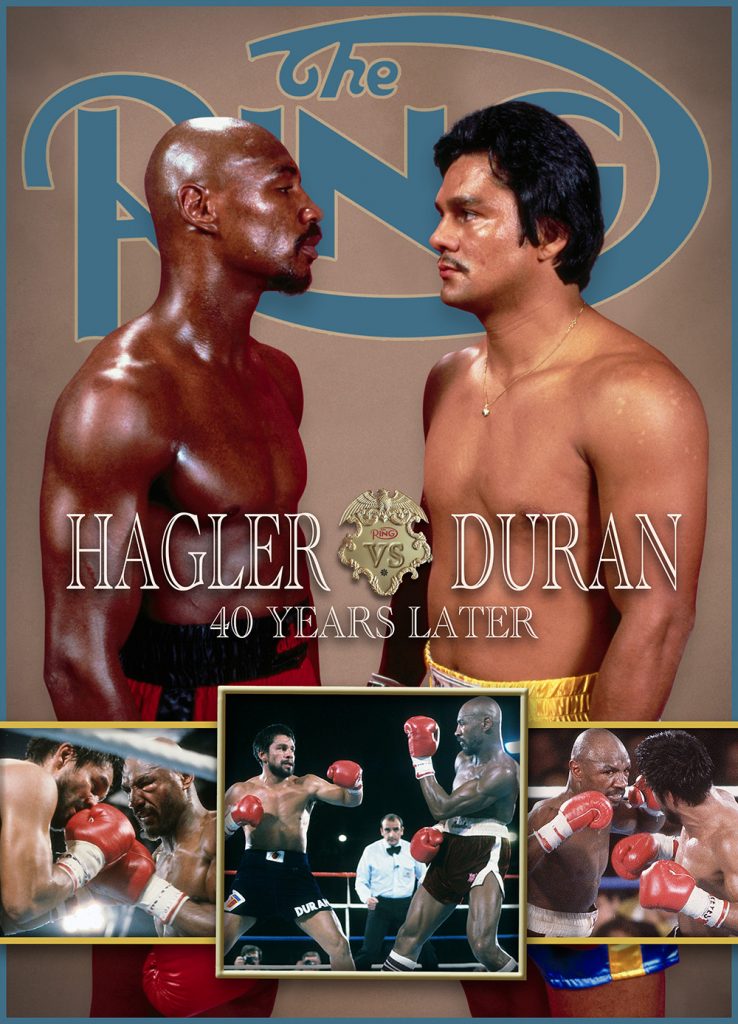Soul of a Champion
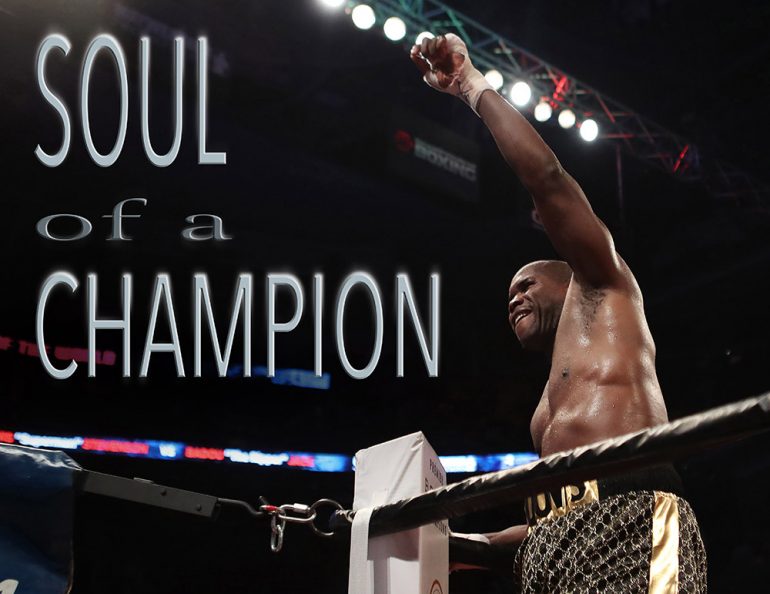
The following article was originally published in the January 2021 issue of Ring Magazine.
ADONIS STEVENSON’S RISE TO THE TOP OF THE LIGHT HEAVYWEIGHT DIVISION WAS IMPRESSIVE, BUT IT WAS ONLY A PRELUDE TO THE FIGHT OF HIS LIFE
Crazy was fistfighting God to breathe life into a lifeless body. Crazy was going to pull him up from that hospital bed. Crazy was going to walk him across that darkened room when no one was there. Crazy was going to feel the cold tile under his feet as he shuffled along.
Crazy kept urging him: You’re going to walk on your own; no one is going to help you.
All fighters carry an amount of crazy in them. Some more so than others.
Adonis Stevenson hauls truckloads of crazy – along with heaps of faith.
Within the span of a week after Stevenson’s light heavyweight title brawl with Oleksandr Gvozdyk on December 1, 2018, Stevenson’s family and friends were told he wouldn’t live—twice. Even if he survived, they were told, he would be a vegetable, unable to walk, talk, see or eat on his own.
Today, when you see the former Ring Magazine champion, he can break out into a song at any moment or emit one of his raucous laughs that fills a room and seemingly carries for miles.
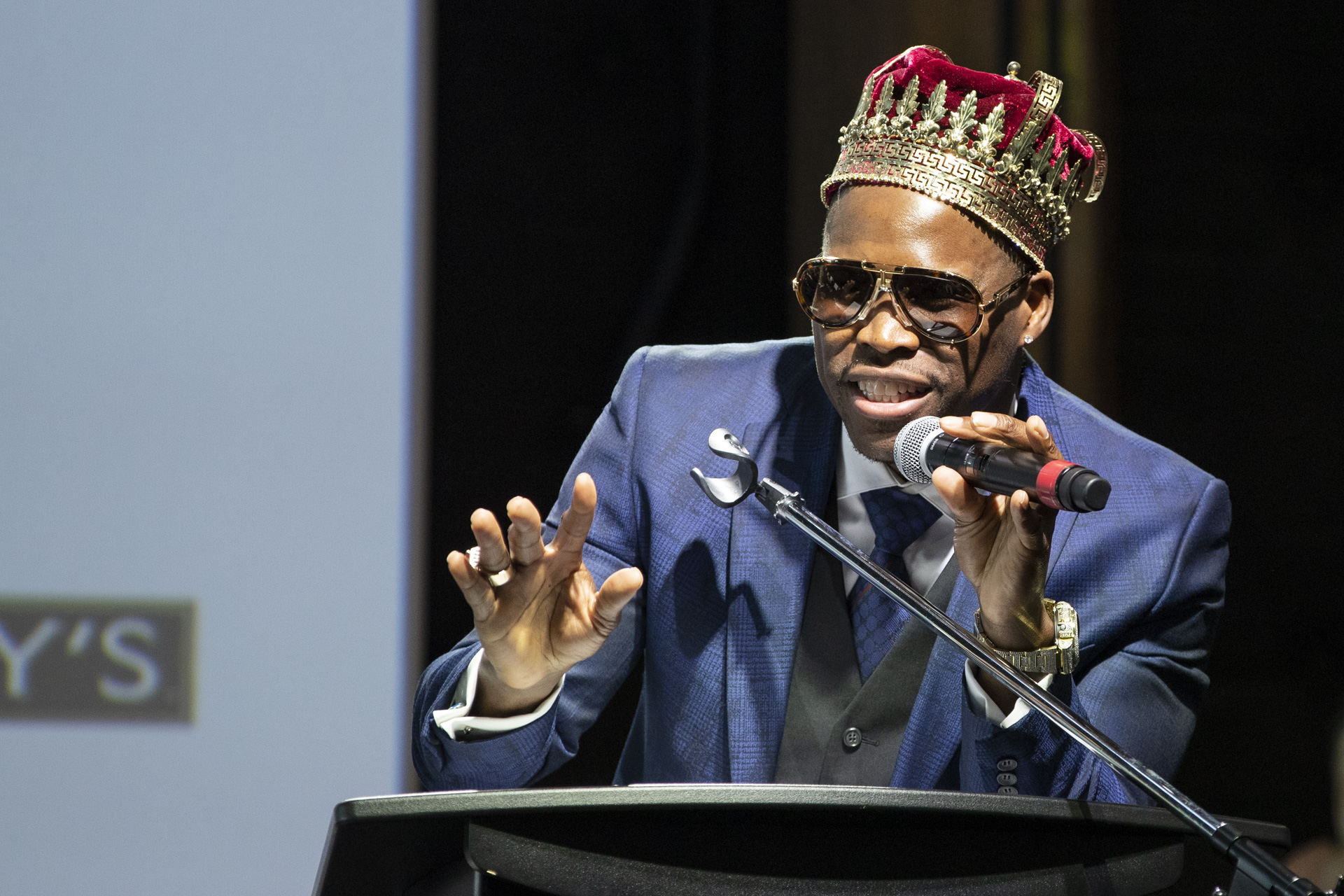
Stevenson before his fight against Badou Jack in 2018. (Photo by Esther Lin/Showtime)
He loves life more. He laughs more. He sings more. He cries more. He’s more.
The Haiti-born, 43-year-old southpaw was in a coma for 17 days. Scans revealed the part of the brain that triggers a recovery from a coma was a black hole. Stevenson doesn’t remember anything during that stretch. What does resonate is this …
“I spoke to God,” he says. “I fought God with my fists; I pleaded with Him to let me see my kids again. I remember fighting with the light. I didn’t want to walk into the light and leave my kids without a father. I embrace the world more after this experience.
“I’m living. You never know what the future will bring to you. You have to believe in God. God gave me a second life. That’s the way I look at it. I have a second life. It is amazing. I’m a miracle. I’m a miracle man. I’m here to help people.
“I want to share my miracle.”
It’s a story of grit and faith. It’s an ordeal that earned Stevenson the Boxing Writers Association of America’s 2019 Most Courageous award. And it started where another story ended.
Stevenson (29-2-1, 24 knockouts) had boiled down to make the 175-pound limit for his 10th WBC title defense, which was against Gvozdyk at the Centre Videotron in Quebec City, Canada.
“I remember little things, but not a lot about the fight,” Stevenson said in his thick Haitian accent. “I was 200 pounds and I lost 25 pounds in a real short period of time. That killed me. My body was blocking everything I tried to do. I lost too many pounds before the fight.
“In boxing, you need a lot of energy. I didn’t have any that night. I usually feel my punches when I hit someone. I couldn’t feel my punches or my movement. I couldn’t really punch. I was trying and I couldn’t do what I normally do.”
It showed.
Gvozdyk (15-0 with 12 KOs at the time) was taking advantage of the drained five-year beltholder.
“Superman” was 41 then. Compounding that, he might have been slightly enervated by a brutal back-and-forth struggle in his previous fight, when Stevenson fought Badou Jack to a majority draw in May 2018.
After a slow start, Gvozdyk had swayed the fight in his favor from the seventh round on and knocked Stevenson out at 2:49 of the 11th. At the time of the stoppage, Stevenson was winning on the scorecards of judges Jack Woodburn (98-92) and Guido Cavalleri (96-94), while judge Mike Ross had it even at 95-95.
Larger problems loomed and would soon arrive.
Yvon Michel, Stevenson’s promoter throughout much of his career, felt supremely confident Superman was beating Gvozdyk.
At the outset of the 10th, Stevenson appeared to have Gvozdyk in some trouble when he connected with a left to the chin. But Gvozdyk recovered midway through the round and it looked like Stevenson had punched himself out.
That set the stage for the 11th.
Stevenson took a right to the head that backed him up with around 1:10 left in the round. Gvozdyk landed another right as the one-minute mark approached. Sensing he was giving Stevenson problems, an emboldened Gvozdyk poured on the pressure. He stepped forward with a right that stunned Stevenson, followed by a left that forced him against the ropes.
Stevenson, seemingly out on his feet, took another flush right, releasing a halo of sweat, before crumbling to the canvas.
Referee Michael Griffin didn’t even bother to count.
Boxing is the heart’s cry for personal peace. Adonis Stevenson was about to lose his. He had been a restless soul through the early portion of his life. Boxing gave him discipline. Boxing gave him substance. Because as a teenager, Stevenson had survived the nasty streets of Quebec. By his early 20s, he was a pimp, doing a four-year prison stretch, vowing upon release that he would never return.
Now, with this traumatic injury, boxing would be taken away for the rest of his life.
Michel ran into the ring to check on Stevenson. He asked Superman how he felt. Stevenson kept repeating, “Don’t worry. Don’t worry.” Michel told him they would talk later in the dressing room – after Michel checked the scorecards to reassure himself that Adonis was still ahead at the time of the stoppage.
“I remember sitting down in the dressing room next to him, showing him the scorecards,” Michel recalled. “I remember telling Adonis what happened to him had happened to many of his opponents in the past, and that he would be back.
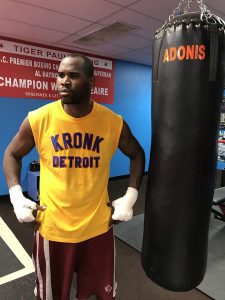
Photo by Sugar Hill Steward
“It was unfortunate how it ended, but I was still feeling Adonis had one or two more fights left. He wanted a rematch with Gvozdyk and then fight Badou Jack and that would be it. He would retire. In my mind, this is what we were going to do.”
Stevenson asked Michel if he should meet with the media. First he wanted to take a shower. Michel had left to watch another fight when he received a call on the arena floor that something was happening in Stevenson’s dressing room.
Michel found Adonis confused and shivering, complaining that he was cold. The commission doctors immediately called for a stretcher. But Stevenson refused to lie on it. Instead, in a peculiar portrait, he sat on the edge of the stretcher as Lamont Jones, Premier Boxing Champions vice president and general counsel of boxing operations, escorted Adonis and his family to the Quebec-Laval University Hospital, a facility that specializes in head trauma, as a precautionary measure.
Feeling Stevenson was in good hands, Michel went back to the arena to watch the live video screening of Deontay Wilder-Tyson Fury I from Los Angeles. Within seconds, he received a call from Jones. Things didn’t look good, Jones said. Moments later, Jones called again to tell Michel that Adonis’ condition had taken a serious turn.
Michel ran to his car.
“I remember the drive to the hospital, worried he had a brain bleed and it was worse than expected,” Michel said. “I didn’t think it would be fatal. When I got to the hospital, I went right to his room. He was lying there with tubes in his mouth and nose.”
That’s when Michel was ushered to a secluded room to be with Stevenson’s family. The attending doctor told them, “Adonis won’t see the morning; it’s a matter of hours.” Stevenson’s brain was exploding under the pressure. His brain grew so swollen that there was little the medical professionals could do.
Claudette Adonis, Stevenson’s mother, let out a gut-wrenching wail, lamenting the impossible. Jones called PBC CEO Al Haymon, who told the family he could immediately move Stevenson to where he could get better care.
The medical team told the family that it was impractical to move him. Besides, the facts were irrefutable. Every test would show the same result: He won’t survive the night.
Stevenson himself faintly remembers portions of what transpired. He said it was like he was watching a movie and his eyes were the projectors slowly fading to black. He recalls trembling in the shower after the fight and the throbbing pain in his head seeping down the rest of his body.
“It was like my insides were burning up when the doctors got to me (in the dressing room),” Stevenson remembered. “I told the doctors that I wasn’t feeling right. They brought a stretcher in. If I was going to go, I wasn’t going to go lying down on a stretcher.
“So I sat.”
When he reached the hospital, Stevenson said, that’s when things went awry. He remembers being in a surreal state, seeing people frantically gesturing around him yet unable to understand what they were saying.
It was as if something was lifting him away.
“I could only feel the pain. I was in another world; it was like a dream,” Stevenson recalled. “You’re watching these things around you and you don’t understand anything.”
A miracle recovery and the healing ahead
Seated in the hospital corridor, head in his hands, Michel began replaying portions of the fight in his mind. How could this happen? Michel tried rationalizing it, though he couldn’t find an answer. He and Jones each asked themselves a thousand questions while they waited for some word about Stevenson’s condition.
At 1:30 on Sunday morning, December 2, the Stevenson family was told again that there was no hope. A few hours later, the family was greeted by a doctor who reported a new development, stating, “Not that I want to give you big hope, but Adonis tried to unplug the tubes with his left hand.”
Michel, who was with his wife, Stephanie, broke down in tears. The Canadian promoter has been in boxing since 1980 and this was the first time something like this ever happened to one of his fighters.
Jones, along with Marcus and Brandon Watson, Sam Watson’s sons, were constantly on the phone providing updates to Haymon as well as PBC’s Sam Watson and Sylvia Browne-Owens.
“Al, Lamont, the whole PBC team were real rocks throughout this whole thing,” Michel said. “They stayed with Adonis and his mother and provided everything. It was as if Al provided them with a blank check. There were a lot of heroes on Adonis’ shoulders throughout this, and Lamont and Al are certainly two of them.”
They’d been on the verge of leading in a priest to deliver the last rites, but once Stevenson showed signs of brain activity, he was rushed into surgery. He was really Superman that night, December 2, 2018.
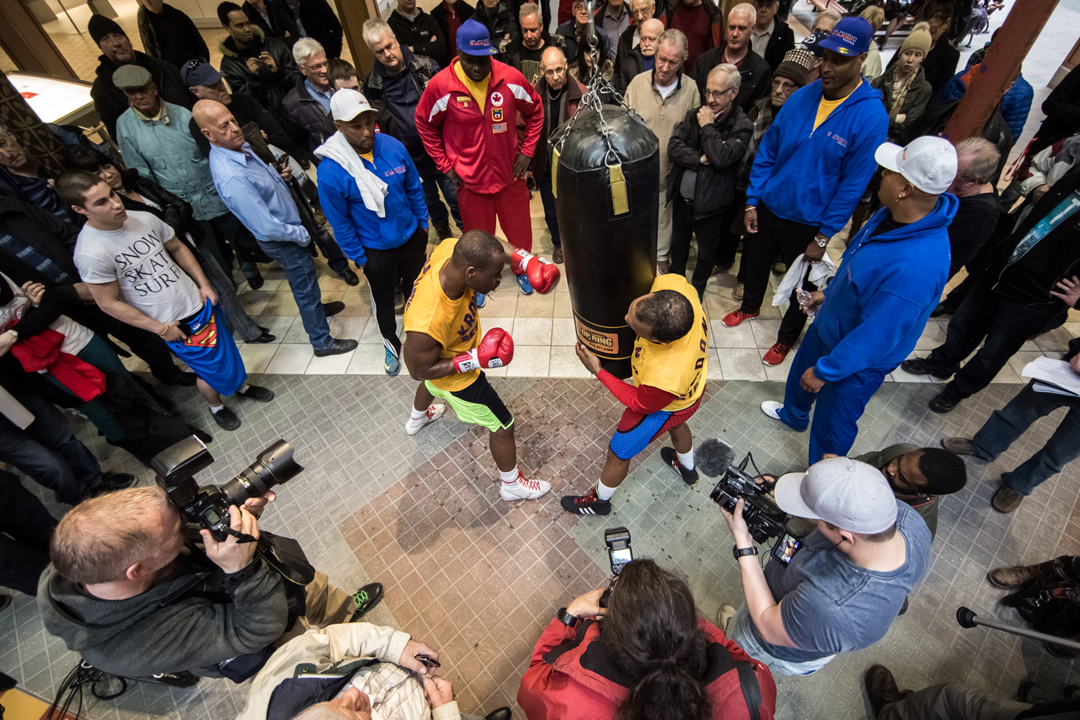
Stevenson at a public workout in 2016.
Michel left for the Sergey Kovalev-Eleider Alvarez promotion in New York while his wife stayed to provide updates. It wasn’t long before the news again turned dire and he was back in Quebec City to see Adonis for what would probably be the last time.
In the hospital room, his fighter teetering on the brink of death, Michel managed to lean in with a comforting hand on Adonis’ shoulder and whisper to him, “You’re still my champion.”
With his eyes closed and on life support, Stevenson weakly lifted his right hand to gesture “number one.”
“That told me he was still alive,” Michel said. “Adonis even tells me today that he remembered that whisper. It was at a stage when we weren’t certain what would happen to him. It’s the first time I thought there was something alive in that body.”
The family noticed, too. Slow hand movement graduated to opening his eyes a week later. Every day, Stevenson started to make improvements.
“It’s a real miracle,” Michel said. “The doctors told us there was a one percent chance that he would live. The second time, we were told he would die. Then a week after, we were told Adonis will possibly survive.
“But we were also told even if he lives, he will have brain damage, and that he would probably be blind, deaf and unable to walk for the rest of his life and possibly not even be able to breathe on his own.
“So, you’re torn. If he survived, would he be better off if he died than if he lived? Would he be a prisoner in his own body? Would his quality of life be zero? It was a decision his family, all of us, feared. None of us wanted Adonis to live like that.”
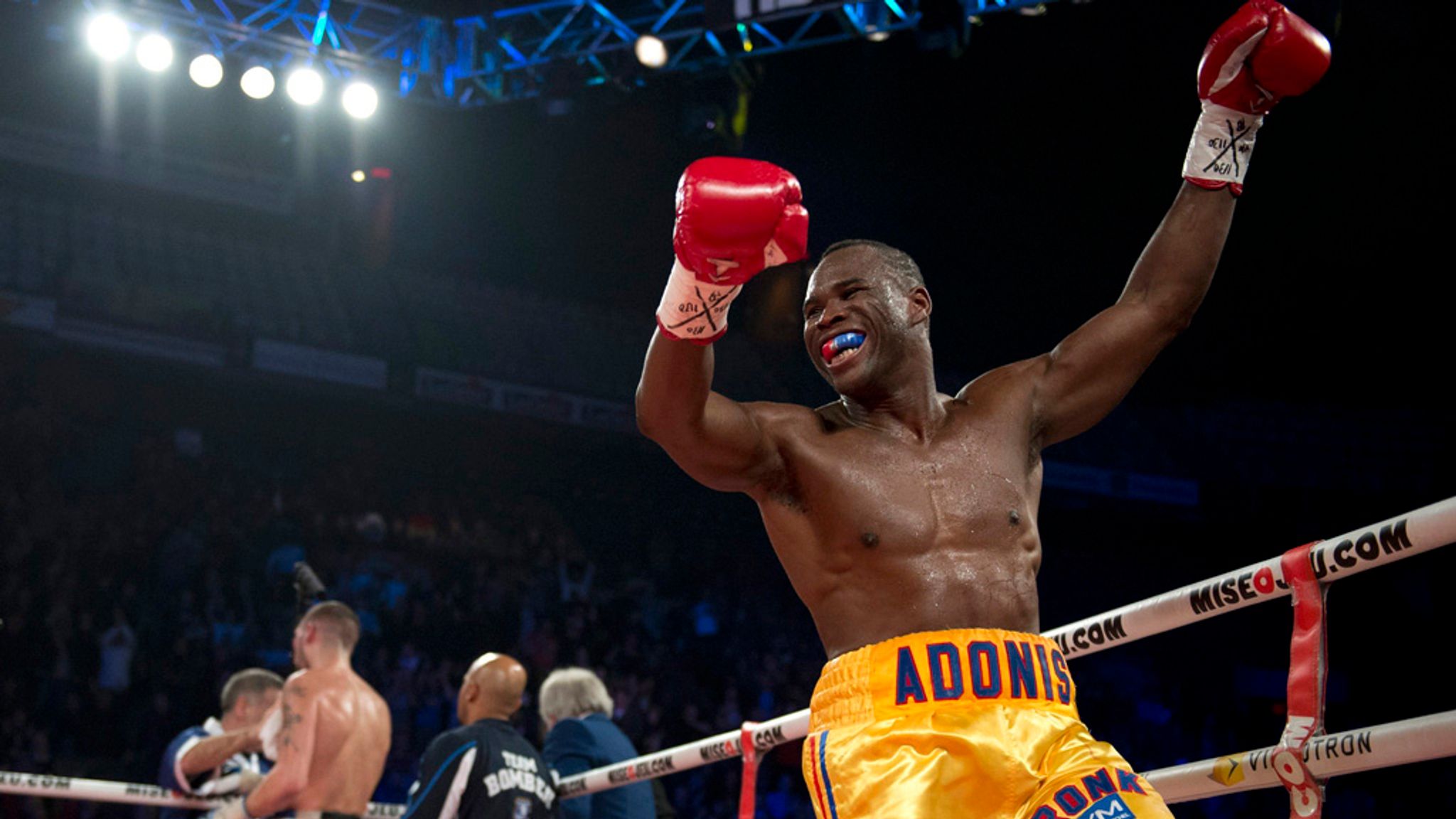
Stevenson celebrates after his victory over Tony Bellew in 2013. (Photo courtesy of Sky Sports)
Stevenson lost 40 pounds. Subsisting on a liquid diet, he went from being a light heavyweight champion to skinny as a finger.
In February 2019, he was transferred from the Quebec City hospital to a Montreal rehab center. The first part of his rehab was recognizing colors on a wall, which progressed to knowing where he was.
But there was also something amazing going on that baffled everyone: Stevenson’s entrenched boxing skills were still intact. Even when he couldn’t walk, Jones would playfully ask him to give him a jab; a double jab; a double jab, left hand; a double jab, right hook.
He always had that. His boxing skills reinvigorated him and brought him back to life. It reached a cautious point where Jones and Michel would warn the rehab therapists to be careful when holding their hands up and asking Stevenson to hit them. Even though he was in a debilitated state, he was a world champion fighter who still possessed a devastating punch. If he had a flashback and threw a punch a certain way, someone could be hurt.
No one was, thankfully.
A month later, Stevenson received a special visitor. Showtime Hall of Fame announcer Steve Farhood took a flight to Montreal on March 27 to see Stevenson at the rehab clinic.
“When I went up, I didn’t know what to expect, but I was pleasantly surprised to find him talking and walking, and walking well, at a relatively early juncture of his recovery,” Farhood recalled. “More importantly, Adonis’ mood was very positive. Adonis has the spirit of a fighter and a champion.
“That’s something that can’t be underestimated. The speed of his recovery was very welcoming and heartwarming. Anyone who has covered boxing for a long period of time has grown, unfortunately, to know each subdural hematoma case is different.
“You can’t lump it all together. But a point worth mentioning, for all of the bitching we do in boxing, the one way that boxing has improved dramatically in the last four decades is ring safety. At least it gives a fighter the best chance, and that wasn’t always the case.”
Farhood’s visit did come with a caveat. Though Stevenson was happy to see a familiar face, which seemed to buoy his disposition, no one else from the boxing world, other than from PBC, seemed to care.
“Yeah, I thought about that on the way back,” Farhood said. “This was a man who almost lost his life and he seemed to be on the road to some kind of recovery. I was very uplifted by the experience. I felt good for what I saw.
“One of the reasons I went to see Adonis was because I wanted to show we still cared. Very few people in boxing paid any attention to Adonis after the injury. That, I thought, was sad.”
Stevenson was later honored by the WBC in October 2019 at its annual convention in Cancun, Mexico, where his beaming smile could have lit a small city. Stevenson was moved to tears as he accepted the “Champion for Life” award from WBC president Mauricio Sulaiman, flanked on the dais by Bernard Hopkins and Badou Jack, who held up Stevenson’s hands.
Stevenson sees his five children, ranging in age from 1 to 11, every day. He says he’s a changed man because of what happened.
When he saw his kids for the first time after the coma, Stevenson turned into a marshmallow, hugging and kissing them, crying out, “Your father is back; he’s back from the dead.”
Claudette was certainly convinced her son’s recovery was an act of God, considering the numerous times she was told Adonis’ brain showed no activity.
“I kept telling myself to take it step-by-step,” said Adonis, before breaking into a bad rendition of the 1990 New Kids on the Block hit by the same name. “I always thought I could return to normal. At night, in the hospital room, I made sure no one was around. I would get up, and I would tell myself, ‘I’m going to do it. I’m going to do it. I’m going to walk across this room.’
“To me, taking those steps was my step [toward recovery]. You have to be a little crazy to do it, but you have to be a little crazy to get into the ring in the first place. I kept asking God, ‘Please God, please God, help me.’ When I was gone, I heard voices. When I was in the coma, God was talking to me.
“I kept telling myself to keep fighting. I made a lot of mistakes in my life. There are things that I’ve done when I was young that I’m not too proud of and I can’t change. But I can be better. God gave me this second chance to be better.”

Joseph Santoliquito is an award-winning sportswriter who has been working for Ring Magazine/RingTV.com since October 1997 and is the president of the Boxing Writers Association of America. He can be followed on Twitter @JSantoliquito.
SUBSCRIBE NOW (CLICK HERE - JUST $1.99 PER MONTH) TO READ THE LATEST ISSUE
